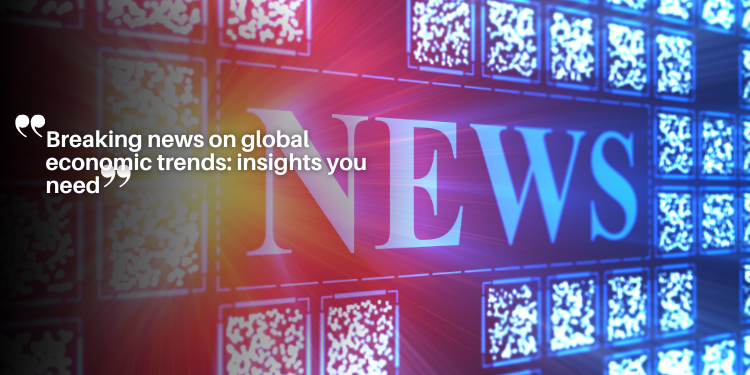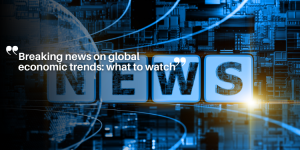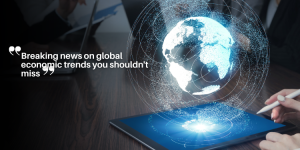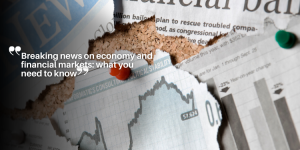Breaking news on global economic trends: insights you need

Future predictions for the global economy highlight technological advancements, the growth of emerging economies, sustainability efforts, and the impact of geopolitical tensions on market stability.
Breaking news on global economic trends highlights the shifting dynamics that affect us all. Have you noticed the changes in your wallet or investments? Let’s dive into how these trends shape our financial future.
Current global economic challenges
Today, we face many global economic challenges that can impact our daily lives. Understanding these issues is essential for staying informed and making smart decisions. Let’s explore some of the most pressing challenges and what they mean for the economy.
Inflation and its Effects
One major challenge is inflation. This means rising prices for goods and services, which can burden consumers. When people have to spend more on essentials, they might cut back on other expenses.
- Basic necessities become more expensive.
- Families may find it harder to save money.
- Businesses may struggle with higher operational costs.
Another significant issue is the labor market. Many companies are having trouble finding workers, leading to job vacancies. This can raise wages in some areas but create challenges for employers.
Supply Chain Disruptions
Supply chain disruptions are also a critical concern. These occur when products can’t reach consumers on time, often due to shipping delays or shortages of materials. This affects many industries, from food to electronics, causing frustration for both businesses and shoppers.
International tensions can worsen supply chain issues. For example, trade restrictions between countries may lead to fewer products available in the market. When this happens, prices typically rise even more, making it tougher for everyone.
Geopolitical Tensions
Geopolitical tensions further complicate the situation. Conflicts between countries can lead to economic instability. Investors might worry about their investments, causing fluctuations in the stock market.
- Instability leads to uncertainty in spending.
- Global partnerships may shift or weaken.
- Technology advancements may slow down due to blocked trade routes.
We must keep an eye on these critical economic challenges as they continue to evolve. By staying informed and adapting, we can better navigate the complexities of our economic landscape and lessen their impact on our lives.

Impact of inflation on markets
The impact of inflation on markets is a serious concern for investors and consumers alike. As prices rise, understanding how this affects different sectors can provide valuable insight into making informed decisions.
Rising Costs for Consumers
When inflation occurs, the cost of everyday items increases, which directly affects consumer spending. People may have less disposable income due to rising prices for food, gas, and housing. This can lead to fewer purchases of non-essential goods.
- Higher prices may cause consumers to shift their buying habits.
- Brands may experience reduced sales as budgets tighten.
- Shift in demand toward more affordable options.
As a result, businesses might have to adjust their pricing strategies and marketing tactics to appeal to cost-conscious shoppers.
Investment Markets and Inflation
Inflation also has a significant effect on investment markets. As inflation rises, the purchasing power of money decreases. For investors, this means that the returns on investments must outpace inflation to maintain value.
Real estate and commodities like gold often become more attractive during inflationary periods. Investors see these as safer bets against declining currency value. On the other hand, bonds may lose appeal, as interest rates typically rise in inflationary environments, making newly issued bonds more attractive than existing ones.
Changes in Interest Rates
To combat inflation, central banks may increase interest rates. This can lead to higher borrowing costs, which impacts consumer loans and mortgages. As a result, spending in housing and large purchases may decrease, leading to a slowdown in the economy.
- Higher interest rates can slow down economic growth.
- Businesses may delay expansion plans.
- Consumers may postpone significant purchases.
Understanding the impact of inflation on markets is essential for navigating the financial landscape. By keeping a close eye on inflation trends, individuals and businesses can make informed decisions that align with the changing economic environment.
Emerging economies and their growth
The emerging economies are capturing attention around the world for their rapid growth and potential. These countries are undergoing significant changes and are becoming critical players in the global market.
Characteristics of Emerging Economies
Emerging economies typically share some common characteristics. They have developing infrastructure, a growing middle class, and increasing foreign investment. These traits contribute to their fast-paced economic growth.
- A rising domestic market fuels consumption.
- Investment in technology and innovation is on the rise.
- Access to a youthful workforce provides opportunities.
As these economies grow, they also face challenges that can impact their growth trajectory, such as political instability or a reliance on exports.
Key Drivers of Growth
One significant driver of growth in emerging economies is globalization. As businesses expand globally, they seek opportunities in these markets. This influx of capital helps to create jobs and stimulate technological advancements.
Additionally, government policies play a crucial role. Many emerging economies are reforming their business regulations to attract foreign investors, which can lead to more robust economic development.
Sector Growth
Particular sectors are expanding rapidly in these economies, such as technology, manufacturing, and renewable energy. For example, the tech sector in emerging markets has seen impressive growth due to increased internet access and mobile technology.
- Manufacturing can benefit from lower labor costs.
- Renewable energy projects are gaining traction as countries strive for sustainability.
- Investment in healthcare is also on the rise, improving overall quality of life.
Understanding the landscape of emerging economies and their growth potential is essential. As these nations continue to develop, they will play an increasingly important role in the global economy, offering insights into future trends and opportunities.
Future predictions for the global economy
Future predictions for the global economy are essential for understanding where we may be headed in the next few years. Analysts are looking at various factors to determine trends and shifts that may affect everyone on the planet.
Technological Advancements
One major area impacting the global economy is technology. With rapid advancements, industries are experiencing significant changes. Automation, artificial intelligence, and blockchain are all driving new efficiencies and altering the job market.
- Automation may reduce the need for manual labor.
- AI can optimize operations across various sectors.
- Blockchain can increase transparency in transactions.
These innovations could reshape how companies operate and how consumers interact with products and services.
Shifts in Global Power
The balance of economic power is also shifting. Emerging economies are gaining influence, which could lead to a more multipolar world. Countries like India, Brazil, and several others are predicted to become increasingly important players in international trade.
This shift may lead to changes in trade agreements and economic partnerships. As these economies grow, they will likely demand a more significant role in shaping global economic policies.
Climate Change and Sustainability
Climate change poses a pressing challenge that will influence future economic conditions. Countries around the world are making efforts to transition to sustainable practices. This shift could lead to new industries focused on renewable energy and environmentally-friendly technology.
- Investment in green technologies may increase.
- Consumer preference is shifting toward sustainable products.
- Regulatory policies will evolve to support sustainable practices.
Adapting to these changes will be crucial for maintaining economic stability. Companies that embrace sustainability may have a competitive edge.
Geopolitical Instability
Geopolitical tensions can also impact economic predictions. Conflicts or uncertainties in key regions can lead to volatility in markets. Investors often react to news, affecting stock prices and currency values.
Understanding the potential risks associated with geopolitical changes is vital for strategizing investments and business growth. Economic forecasts must always consider these factors to provide a comprehensive outlook.
Future predictions for the global economy require a holistic view that encompasses technological, political, and environmental aspects. By staying informed about these trends, businesses and individuals can better prepare for what lies ahead.
FAQ – Frequently Asked Questions about Global Economic Predictions
What are emerging economies?
Emerging economies are countries experiencing rapid growth and industrialization, often gaining more influence in global markets.
How does technology impact the global economy?
Technology drives efficiency, changes job markets, and creates new industries, greatly influencing economic growth.
What role does climate change play in future economic predictions?
Climate change pushes companies towards sustainable practices, leading to the growth of green industries and technologies.
Why are geopolitical tensions important to consider?
Geopolitical tensions can create uncertainty and volatility in the markets, impacting investments and economic stability.







